'Bostin' Irish': Are the Irish still big in Birmingham?
- Published
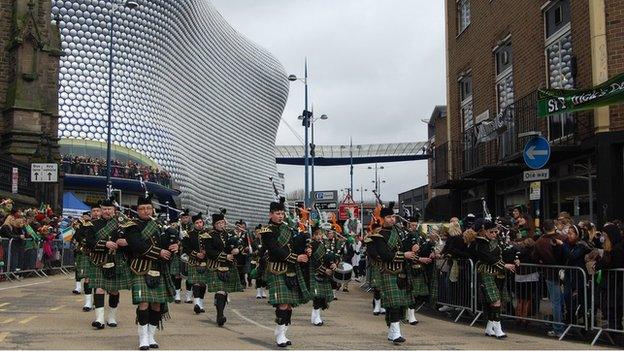
Birmingham's St Patrick's Day Parade is expected to draw crowds of more than 80,000 people
They once made up 4% of Birmingham's population and were its biggest minority group - but official figures say the number of Irish in the city has declined.
Yet 80,000 people are expected to attend the city's annual St Patrick's Day parade - believed to be the third biggest in the world, external after New York and Dublin - on Sunday. Are the Birmingham Irish really disappearing? Or has the definition simply changed?
The city's Irish connection is plain to see; passengers arriving at Birmingham's coach station are greeted by a sign reading "one hundred thousand welcomes" - a translation of the Gaelic greeting "cead mile failte".
Its placement - in "Irish Quarter" Digbeth - is no accident.
The storied Dubliner pub - restored after it was gutted by a fire , externalin 2006 - sits next door while Birmingham's Irish Centre is a few hundred yards down the road.
'No work here'
Regarded by some as a spiritual home of the Irish in Birmingham, Digbeth is also the terminus for the St Patrick's Day parade.
But statistics say the number of Irish-born in the city has shrunk.
The 2001 census counted 22,828 Republic of Ireland-born and 6,086 Northern Irish Birmingham residents in 2001, whereas those numbers had dropped to 16,085 and 4,623 in 2011.
Two other cities in Britain noted for their Irish populations - Liverpool and Manchester - showed a more modest decrease in the same period, and, in fact, Merseyside's ROI-born contingent fell by just three.
However, 50,900 Irish nationals emigrated from the Republic of Ireland in 2013, external, and a survey, external found almost 60% of respondents did so to find work.
The same report, from University College Cork, found New Zealand, Australia and Canada were drawing increasing numbers but the UK remained the most popular destination.
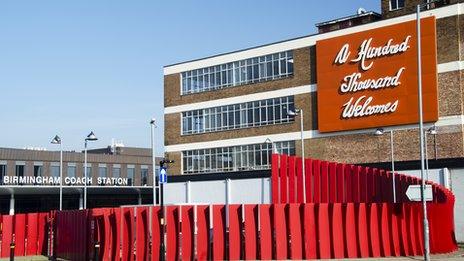
Coach passengers arriving in Birmingham are met by a Celtic greeting
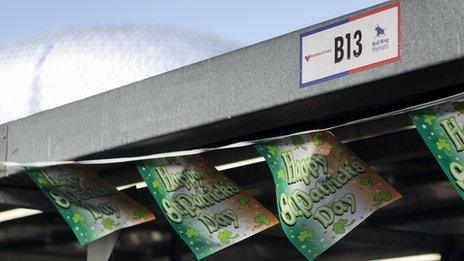
St Patrick's Day is still one of Birmingham's biggest events
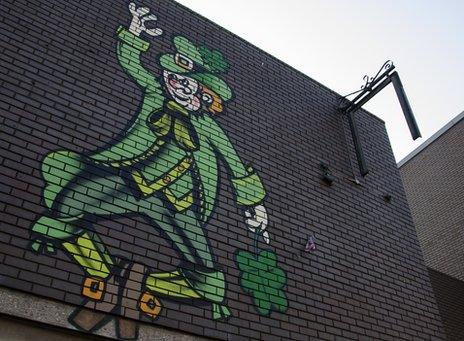
Some Irish businesses, like Digbeth's Mercat pub, have closed down
Paddy Foy, chairman of the Midlands Republic of Ireland Soccer Supporters Club, believes young Irish - many of them equipped with degrees - are heading for London instead of Birmingham.
He said the stereotype of the Irish "navvy" - manual workers employed in the construction industry - often no longer applies.
"When my mum and dad moved over in the 1950s the Irish did the jobs the English didn't want to do," he said.
"My dad helped to build [Birmingham landmarks] Spaghetti Junction and the Rotunda.
"Now the Irish are going to London to join big corporations because that's where the jobs are seen to be."
Maurice Long, of the Kerry Association, said Irish people were still coming to Birmingham to find work, but the flow was "slowing down".
"The call to Birmingham is not like it used to be, work availability is not here, the cash is not here," he said.
"A lot of people are choosing New Zealand and Australia - those places don't seem so far any more.
"When I used to go home to Ireland the journey from New Street station took 23 hours."
Mr Long, who emigrated to Birmingham 50 years ago, added young people who do look for work in the Midlands often stay for a short time.
"They've found Birmingham wasn't as good as they thought and they've come from one recession into another," he said.
'Strong Irish culture'
But do the numbers tell the whole story? While the official statistics suggest just over 20,000 Irish-born in Birmingham, they don't take children - or grandchildren - of immigrants into account.
Organisations such as the charity Irish in Birmingham have said counting second and third-generation descendents in the city's Irish community would put the numbers closer to 100,000.
Anne Tighe, head of Birmingham's St Patrick's Day Parade board, said while the older generation may be fading, their offspring were keeping Birmingham's Irish tradition alive.
Born in the city to Irish parents herself, she said there was still evidence of a thriving community.
"I think it's a very strong Irish culture in Birmingham," she said.
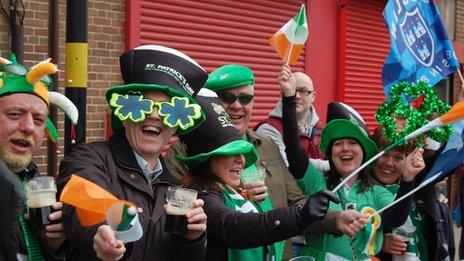
The theme of this year's parade is Irish Myths and Legends
"We have Gaelic football teams, a fantastic Irish dancing scene, there are places you can learn Irish instruments and there's a great music scene for both traditional and more modern artists.
"There are still a lot of Irish traditions and Irish family values, those are all very strong in the Irish community in Birmingham."
Siobhan Mohan, editor of community newspaper The Harp, agreed Birmingham's Irish-born population was ageing.
"The demographic seems to be changing, on the parade day you used to see lots of first-generation Irish in the crowd but the numbers seem to be dwindling these days," she said.
Ms Tighe said she felt the St Patrick's Day parade was a chance to not only celebrate Irishness, but the "unique" Irish culture in Birmingham.
"I think of myself as British but I regard my Irish roots as very strong and I'm also proud of being a Brummie," she said.
"From my point of view organising the parade is important because I want Birmingham to be proud of and celebrate its history.
"A lot of other cities are much better at recognising that and I think we should be too."
- Published17 March 2013
- Published3 January 2013